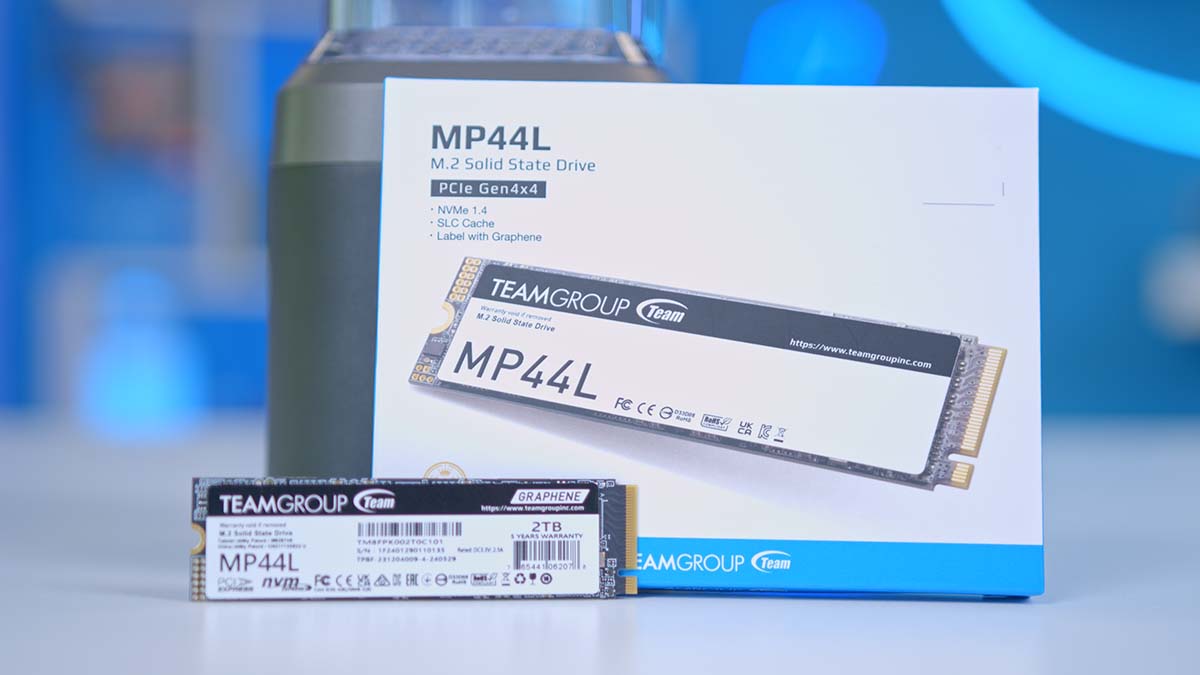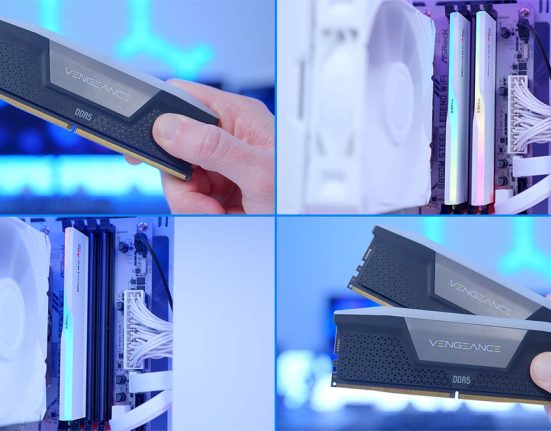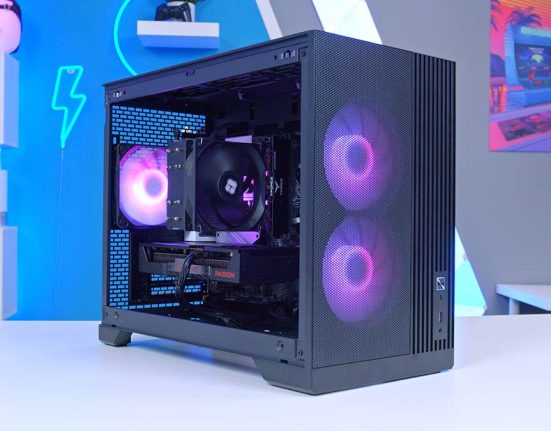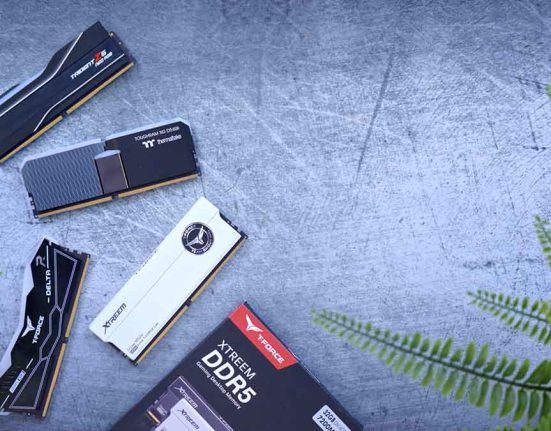The TeamGroup MP44L is an affordable Gen4 SSD designed to meet a range of storage needs while providing a high-speed drive for budget-conscious users. However, the current market is getting ready for a new wave of Gen5 SSDs while motherboard manufacturers are looking to provide better compatibility across AMD X870 and Intel LGA1851 options, releasing in Q3 and Q4 2024. Gen4 SSDs may start to go out of style as the way is paved for even faster storage. Despite this, we’ve tested the TeamGroup MP44L rigorously in a set of benchmarks to see how it performs compared to market alternatives.
While the TeamGroup MP44L may be on borrowed time as Gen5 SSDs become more popular, its tantalisingly low price point will likely sway most prospective buyers on the hunt for affordable storage. In this review, we’ll assess the TeamGroup MP44L by analysing the specs, design, and performance, as well as both speeds and thermals, to see how it fares against the hefty competition.
Buy the TeamGroup MP44L on:
Specification
The Teamgroup MP44L comes in four different capacities, from 250GB up to 2TB, which is the variant. Sequential read speeds hover around 5000MB/s for 500GB and 1TB models, while 250GB and 2TB variants offer 4650MB/s and 4800MB/s, respectively.
Write speeds differ significantly, with the 250GB version offering the weakest performance, while the 1TB drive remains the strongest at 4500MB/s on the writes. However, the 2TB capacity MP44L isn’t far behind, with a 100MB/s difference down to 4400MB/s. Competitor-wise, the TeamGroup MP44L is not the best performer on the market, aligning with a significant selection of mid-range drives that cap out at 5000MB/s. Despite this, the TeamGroup MP44L is one of the most affordable Gen4 SSDs, sitting at $64.99 at the time of writing.
| Specification | TeamGroup MP44L |
|---|---|
| PCI-E Generation | Gen4 |
| Capacity | 250GB, 500GB, 1TB, 2TB |
| Sequential Read Speed | 250GB: 4650MB/s 500GB, 1TB: 5000MB/s 2TB: 4800MB/s |
| Sequential Write Speed | 250GB: 1900MB/s 500GB: 2500MB/s 1TB: 4500MB/s 2TB: 4400MB/s |
| Warranty | 5 years |
| Endurance | 250GB: 200TBW 500GB: 300TBW 1TB: 600TBW 2TB: 1200TBW |
| Form Factor | M.2 2280 |
The TeamGroup MP44L comes with a manufacturer’s warranty of five years, which is a relatively standard offering compared to other drives we’ve reviewed. Endurance also isn’t particularly impressive, sitting at 200TBW with the 250GB, 300TBW at 500GB, and doubling until we hit 2TB. The MP44L utilises the 2280 form factor, which most modern motherboards support.
From a glance, the MP44L doesn’t come with a heatsink variant, but as this drive utilises PCI-E 4.0 bandwidth, additional cooling isn’t often needed. Most motherboard heatsinks will keep the drive cool. However, it would be nice to see a heatsink model, as this can spice up the aesthetic of your build.
Suggested Article: Corsair MP700 Pro SE SSD Review
TeamGroup MP44L Design
The TeamGroup MP44L isn’t the most exciting SSD in terms of the overall aesthetic. Much like the MP700 Pro SE, the lack of a heatsink, fan, or any RGB lighting means that the MP44L, to be reductive, is a small PCB with some flash storage chips on it. Despite this, the lack of exciting design elements allows the MP44L to be easily tucked away under a motherboard heatsink, blending in with the design of most PC builds.

As mentioned in the Specs section, the MP44L uses the 2280 form factor (which translates to 22mm wide and 80mm long), which is supported by a wide range of motherboards. This drive features a small label covering the flash chips, providing better heat transfer. While the MP44L would benefit from additional RGB to add flair to the design, the affordable price point makes this easier to swallow.

It’s worth noting that while TeamGroup hasn’t specified that the MP44L needs to sit under a motherboard heatsink to ensure decent thermals, we recommend using a heatsink with this drive to keep temperatures low. The heatsink significantly increases dissipation, allowing the flash chips to reach the best speeds possible. Performance will vary without passive or active cooling.
Are High-Speed SSDs Needed for Gaming?
It’s well known that over the past few years, the market has slowly shifted away from SATA to M.2, as NVMe drives have become highly affordable and offer significantly better performance. But do you need a high-speed drive to play your favourite games? In short, the answer is no. While it’s true that gaming has become much more demanding compared to what it was ten years ago, the performance requirements have shifted towards graphics cards and CPUs more than storage.

While this doesn’t mean that top-end drives are entirely unnecessary, as they will benefit enthusiasts’ builds that need more robust read and write speeds. For gaming, an SSD like the TeamGroup MP44L is ideal. It strikes a delicate balance between pricing and performance, making it a solid pickup for those just playing games.
However, to play devil’s advocate, however, high-speed drives may become more of a necessity in the future. Games are slowly becoming more demanding, and as technologies like the Direct Storage API become integrated into newer titles, a speedy SSD will be beneficial to ensure the best performance. For this reason, it could be worth putting some cash aside for better storage to avoid any bottlenecks in the coming years.
Thermals
To measure the temperatures of the TeamGroup MP44L, we fired up CrystalDiskMark with HWMonitor in the background to report on the thermals and utilisation. CrystalDiskMark places an artificial load on a drive of our choosing by transferring files of a specific size; once the benchmark is finished, it provides a result of the read and write speeds.

During 100% utilisation, temperatures hovered around 55°C, dropping to 50°C, followed by 46°C at idle. Thermals weren’t particularly impressive overall. While a high of 55°C is not considered dangerous, we expected better from this Gen4 SSD. If we compare it to a drive like the MP700 Pro SE, which offers considerably better speeds of 14000MB/s and 12000MB/s (which sat at 52°C at 100% utilisation), there’s room for improvement. The weaker bandwidth of Gen4 drives compared to Gen5 generally makes them more thermally efficient, so it is disappointing to see weak temperatures here.
Performance
To determine what kind of speeds the TeamGroup MP44L can offer, we booted up CrystalDiskMark, an application we use across all of our SSD benchmarks. This test provides sequential read and write speeds measured in ‘MB/s’ (megabytes per second), showing how the MP44L will perform across games and general usage.
Strangely, upon testing the TeamGroup MP44L, we encountered some odd data. As a general rule of thumb, when you test an SSD using CrystalDiskMark, it is relatively common for a drive to perform slightly worse than the rated speeds. Manufacturers always caveat the advertised performance with ‘up to’, meaning performance will vary slightly, but the data is usually quite close.

However, when we ran our standard tests for the TeamGroup MP44L, CrystalDiskMark reported speeds over 7000MB/s on the sequential reads and over 6000MB/s on the sequential writes. Our immediate assumption was that we’d selected the wrong drive, like a Seagate Firecuda 530, hence the odd readings. But after double-checking the drive model number and volume label, this was, in fact, the correct drive.
We’re not entirely sure why these readings show that the TeamGroup MP44L is performing significantly better than its advertised speeds, and this isn’t data we’ve encountered in our experience testing drives. It’s also not likely that CrystalDiskMark is the culprit here because we can see in the recording that the MP44L is spinning up to 7000MB/s on the reads.
After several retests across different applications, we saw the same results returned each time. The only main point to note is that the second row of data, known as ‘SEQ1M Q1T1’, provided results closer to the advertised ratings. Again, we’re not entirely sure why this is the case, but this might be the actual result instead of what the top row is showing.
Performance Retests
After encountering the strange results from the MP44L 2TB variant, we contacted TeamGroup to request a replacement drive. At the same time, there is a possibility that the 2TB drive could significantly outperform its rated specs. But in our experience of testing other drives, we’ve never encountered an SSD that overperformed by 2000MB/s. Understandably, this raised alarm bells for us.
TeamGroup very kindly sent us a replacement 1TB SSD to examine, which we sought to retest as soon as it arrived. After installing it in our benchmarking system and firing up CrystalDiskMark, we immediately felt a sigh of relief.

CrystalDiskMark reported an average read speed of 5152MB/s, while writes sat around 4450MB/s. Compared to the advertised speeds of the 1TB version, our benchmarking was incredibly close. TeamGroup reports sequential reads and writes up to 5000MB/s and 4500MB/s, respectively. Based on our findings, the data is within the 10%+- margin we grant for benchmarking.
In our SSD testing graph, the MP44L is one of the weaker drives on the market, sitting between the Samsung 990 EVO and Crucial P3 Plus. Admittedly, that does mean the MP44L won’t be the best option for top-end systems, especially workstation applications. However, based on its low price, the MP44L is a smash hit for gaming.

Conclusion
TeamGroup MP44L

Product Name: MP44L
Brand: TeamGroup
-
Design
-
Thermals
-
Performance
-
Value For Money
Summary
The TeamGroup MP44L Gen4 drive is a highly affordable NVMe SSD designed to offer solid speeds for gaming at a great price point. If we’re looking at performance alone, the MP44L isn’t the most impressive Gen4 SSD we’ve reviewed, especially compared to top-end options like the Seagate Firecuda 530 and Samsung 990 Pro. But as a budget drive, performance isn’t a significant point of contention for us. The price point is where the MP44L shines versus other SSDs. While Gen4 drives have become affordable, there are outliers, and the MP44L is one of the few drives that provides an exceptional price point that is hard to say no to.
While our initial results were strange, after many retests, the performance of this drive aligns more with what we expected. Additionally, the MP44L has never been a point of failure within PC builds that we’ve put together, and it holds up very well within games and other intense applications. We’ve retained the anomalous data for fairness, but the 1TB variant is much closer to the advertised specs, indicating the 2TB drive we had could have been potentially faulty. Regardless, the MP44L is a drive that we’d recommend for budget systems or those just planning on playing the latest games.
Pros
✅ Affordable
✅ Speeds on lower capacities
✅ Price per GB
Cons
❌ Weak thermals
❌ No heatsink variant
❌ Performance versus other drives






![FI_[DM86] Montech King 45 Pro + RX 9070](https://geekawhat.com/wp-content/uploads/2026/01/FI_DM86-Montech-King-45-Pro-RX-9070-551x431.jpg)
![FI_[DP056] Antec flux M + 9060XT](https://geekawhat.com/wp-content/uploads/2025/12/FI_DP056-Antec-flux-M-9060XT-551x431.jpg)
![MPI_[DP055] SAMA V60 + 9070 Build Montage](https://geekawhat.com/wp-content/uploads/2025/12/FI_DP055-SAMA-V60-9070-551x431.jpg)